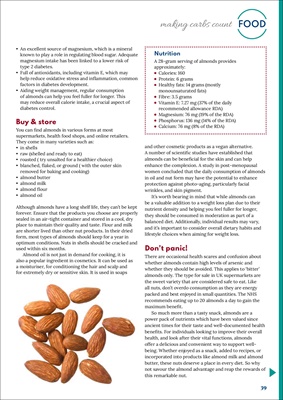
39
FOOD
making carbs count
• An excellent source of magnesium, which is a mineral
known to play a role in regulating blood sugar. Adequate
magnesium intake has been linked to a lower risk of
type 2 diabetes.
• Full of antioxidants, including vitamin E, which may
help reduce oxidative stress and inflammation, common
factors in diabetes development.
• Aiding weight management, regular consumption
of almonds can help you feel fuller for longer. This
may reduce overall calorie intake, a crucial aspect of
diabetes control.
Buy & store
You can find almonds in various forms at most
supermarkets, health food shops, and online retailers.
They come in many varieties such as:
• in shells
• raw (shelled and ready to eat)
• roasted ( try unsalted for a healthier choice)
• blanched, flaked, or ground ( with the outer skin
removed for baking and cooking)
• almond butter
• almond milk
• almond flour
• almond oil
Although almonds have a long shelf life, they can't be kept
forever. Ensure that the products you choose are properly
sealed in an air-tight container and stored in a cool, dry
place to maintain their quality and taste. Flour and milk
are shorter lived than other nut products. In their dried
form, most types of almonds should keep for a year in
optimum conditions. Nuts in shells should be cracked and
used within six months.
Almond oil is not just in demand for cooking, it is
also a popular ingredient in cosmetics. It can be used as
a moisturiser, for conditioning the hair and scalp and
for extremely dry or sensitive skin. It is used in soaps
and other cosmetic products as a vegan alternative.
A number of scientific studies have established that
almonds can be beneficial for the skin and can help
enhance the complexion. A study in post-menopausal
women concluded that the daily consumption of almonds
in oil and nut form may have the potential to enhance
protection against photo-aging, particularly facial
wrinkles, and skin pigment.
It's worth bearing in mind that while almonds can
be a valuable addition to a weight loss plan due to their
nutrient density and helping you feel fuller for longer,
they should be consumed in moderation as part of a
balanced diet. Additionally, individual results may vary,
and it's important to consider overall dietary habits and
lifestyle choices when aiming for weight loss.
Don't panic!
There are occasional health scares and confusion about
whether almonds contain high levels of arsenic and
whether they should be avoided. This applies to 'bitter'
almonds only. The type for sale in UK supermarkets are
the sweet variety that are considered safe to eat. Like
all nuts, don't overdo consumption as they are energy
packed and best enjoyed in small quantities. The NHS
recommends eating up to 20 almonds a day to gain the
maximum benefit.
So much more than a tasty snack, almonds are a
power pack of nutrients which have been valued since
ancient times for their taste and well-documented health
benefits. For individuals looking to improve their overall
health, and look after their vital functions, almonds
offer a delicious and convenient way to support wellbeing. Whether
enjoyed as a snack, added to recipes, or
incorporated into products like almond milk and almond
butter, these nuts deserve a place in every diet. So why
not savour the almond advantage and reap the rewards of
this remarkable nut.
Nutrition
A 28-gram serving of almonds provides
approximately:
Calories: 160
Protein: 6 grams
Healthy fats: 14 grams (mostly
monounsaturated fats)
Fibre: 3.5 grams
Vitamin E: 7.27 mg (37% of the daily
recommended allowance RDA)
Magnesium: 76 mg (19% of the RDA)
Phosphorus: 136 mg (14% of the RDA)
Calcium: 76 mg (8% of the RDA)